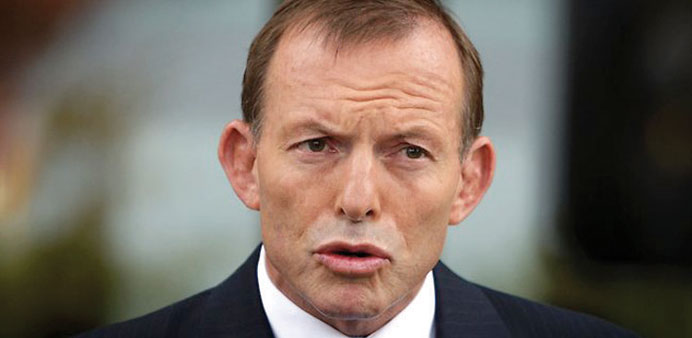AFP/Sydney
Australia is set to introduce new counter-terrorism laws, prime minister Tony Abbott said yesterday, with the package expected to include stripping dual nationals who are linked to terrorism of their citizenship.
There has also been speculation that the plan to amend citizenship laws, which was disclosed in February, could affect second-generation Australians who carry only one passport.
At the same time, the government is considering introducing a “jihadi watch” programme in schools, which would keep tabs on pupils whose behaviour suggests they might have been radicalised, it was announced yesterday.
“It’s long been the case that if you have served with the armed forces of a country at war with Australia, you automatically lose your citizenship,” Abbott told reporters.
“People who are fighting with terrorist groups overseas or who are engaged in terrorist activities here in Australia are effectively taking up arms against us. And it’s very hard to imagine that we should allow to remain in the bosom of our country people who are trying to destroy us.”
Australia raised its threat level to high last September and has since carried out a series of counter-terrorism raids, with several alleged plots foiled this year.
Canberra has also taken a tough stance against radicalised citizens amid alarm at the departure of more than 100 of its nationals to Iraq and Syria to fight alongside jihadists including the Islamic State (IS) group.
Abbott on Tuesday ruled out any leniency for returning jihadists following reports three citizens suspected of fighting with IS were negotiating with the government to come home.
Today an inquest resumes into a Sydney cafe siege in December in which two hostages and the gunman, Iranian-born self-styled cleric Man Haron Monis, died.
The first two weeks of the inquest will explore Monis’s background.
The prime minister would not comment on a media report published Thursday that his government was also exploring the possibility of stripping second-generation Australians of their citizenships if they are linked to terrorist activity. He said only that further details of the legislative changes would be released in a few days.
The possible measures, which were raised in The Australian newspaper, would force such nationals to take on citizenship of their parents’ birth countries.
Immigration Minister Peter Dutton told the newspaper other citizenship rights, such as voting, welfare and further government benefits, could also be lost.
Concern about young Australians being radicalised online has also prompted the government to consider the “jihadi watch” programme in schools, where teachers and students are trained to spot pupils whose behaviour might be changing, attorney-general George Brandis said yesterday.
“The government is working with community organisations and other governments around Australia to develop education materials and deliver training to identify and steer individuals away from ideologies of hate,” Brandis told Melbourne’s Sunday Herald Sun.
Abbott said in a video message earlier yesterday that “at least 250 Australians, some very young, have become ensnared in the evil ideology of the Daesh (IS) death cult”, but did not elaborate on the nature of their alleged involvement. He added that domestic spy agency ASIO had “over 400 priority counter-terrorism investigations”.
Australia has already introduced a series of national security measures over the past few months. They include criminalising travel to terror hotspots and requiring telecommunications firms to retain customers’ digital data for two years.
Prime minister Tony Abbott yesterday said his country would not follow Ireland’s lead and hold a referendum on gay marriage, adding that any decisions would be made by parliament.
Ireland Saturday became the first nation in the world to approve same-sex marriage by referendum with an overwhelming 62% “Yes” vote.
“It really is a matter for the parliament,” the Australian leader said when asked by reporters if a public poll should be held in Australian.
“Referendums are held in this country where there’s a proposal to change the constitution. I don’t think anyone’s suggesting that the constitution needs to be changed in this respect.
“Under the constitution, questions of marriage are the preserve of the Commonwealth parliament.”
Gay marriage was explicitly outlawed in Australia under a 2004 revision of the national Marriage Act by the conservative prime minister at the time, John Howard.
Same-sex couples can have civil unions or register their relationships in most states across Australia, but the government does not consider them married under national law.
Abbott’s conservative government is opposed to gay marriage and the party has previously refused to allow a conscience vote among its members, in contrast to the Labor opposition.
A vote on the issue in 2012 was defeated 98 to 42 after Abbott did not allow his MPs, then in opposition, to break with party lines, rendering it a null prospect.
Abbott, whose sister Christine is gay, said he was aware of the strong feelings on the issue.
“Not for a second do I want to underestimate the feelings that people have on this issue, both for and against,” he added.

Premier Tony Abbott.
